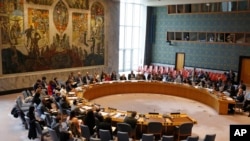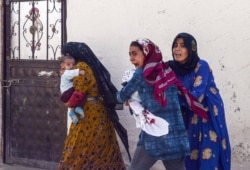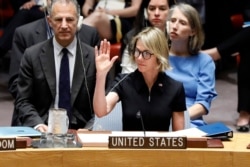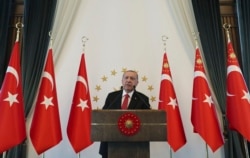National Security Correspondent Jeff Seldin contributed to this report.
UNITED NATIONS - The U.N. Security Council met Thursday to discuss the military operation in northeastern Syria that Turkey says is a "measured and responsible" anti-terror operation, while the mainly Kurdish fighters in the region appealed for help to "save our people from genocide."
Council diplomats were united in their concern that the Turkish incursion could exacerbate an already difficult humanitarian situation, and some members called directly on Turkey to end its operation.
"We call upon Turkey to cease the unilateral military action as we do not believe it will address Turkey's underlying security concerns," Germany's Deputy U.N. Ambassador Jürgen Schulz said on behalf of the Security Council's five European members plus Estonia, which will join the council in January 2020.
"Renewed armed hostilities in the northeast will further undermine the stability of the whole region, exacerbate civilian suffering and provoke further displacements, which will further increase the number of refugees and IDPs [internally displaced persons] in Syria and in the region," he told reporters while flanked by his colleagues.
Turkey launched its long-planned operation on Wednesday with airstrikes and followed up with ground troops. Its defense ministry said in a statement Thursday the operation continues successfully.
In a letter to the United Nations, Turkey said its response would be "proportionate, measured and responsible."
Ankara is targeting Kurdish fighters it views as terrorists, but which most of the West consider to be key partners in the fight against militants from the so-called Islamic State terror group. The military operation began days after an unexpected and widely criticized White House announcement that U.S. forces would withdraw from the region.
The U.S. ambassador to the United Nations, Kelly Craft, told reporters after the one-hour closed-door council meeting that Turkey bears full responsibility for protecting civilians and ensuring that no humanitarian crisis takes place.
"In addition, Turkey is now responsible for ensuring that all ISIS fighters in detention, in prison, remain in prison, and that ISIS does not reconstitute itself in any way, shape, or form," she said, echoing tweets and statement from President Trump and using an acronym for the Islamic State terror group. "Failure to play by the rules, to protect vulnerable populations, failure to guarantee that ISIS cannot exploit these actions to reconstitute, will have consequences."
Kurdish forces in the area run detention centers with thousands of captured IS foreign fighters.
While saying "all sides should exercise maximum restraint" during the operation, Russia's U.N. envoy appeared to signal that Moscow would block the possibility of a unified statement from the 15-member council.
"If there is a product of the Security Council, it should take into account other aspects of the Syrian crisis, not just the Turkish operation," Russian ambassador Vassily Nebenzia told reporters. "It should speak about the illegal military presence in that country — and they need to terminate it immediately — and there are many other issues that are in the Syrian file that should be mentioned if there is any product from the Security Council."
Russia objects to the presence of the U.S.-led coalition against IS in parts of Syria.
Turkish President Recep Tayyip Erdogan claims that 109 "terrorists" have been killed, referring to the Syrian Kurdish fighters. He also warned Thursday he would send Syrian refugees to Europe if the European Union refers to Turkey's operation as an "invasion." NATO Secretary-General Jens Stoltenberg is expected to meet Friday with Erdogan in Istanbul.
The Kurdish-led Syrian Democratic Forces (SDF) said it "confronted an incursion attempt" by Turkish forces in Tal Halaf, and also a cell of Islamic State fighters in an area south of Ras al-Ayn. Kurdish official Diyar Ahmed said the area was surrounded by Turkish forces.
"Turkish planes have been striking from the air. At the same time, their heavy weapons haven't stopped, they aren't stopping in firing on the village, and civilians have been both wounded and lost their lives," Ahmed said.
U.S. officials say they are monitoring reports of attacks by Islamic State sleeper cells, with one official telling VOA that "any unilateral action in northeastern Syria was of grave concern" because it could cause a situation that the terror group "could exploit."
In a Washington Post opinion piece published late Wednesday, Hemin Kobane, the SDF's liaison with the U.S.-led coalition against the Islamic State, accused the United States of casting aside the Kurds and "leaving them to their fates at the hands of their mortal enemies."
Kobane cited the years of cooperation between U.S. and SDF forces in taking back territory from Islamic State, calling U.S. forces "our friends and brothers" against a common enemy.
President Trump has said the United States "does not endorse this attack" and made it clear to Turkey the operation is a "bad idea."
He continued to defend the move Thursday, tweeting that "Turkey has been planning to attack the Kurds for a long time. They have been fighting forever. We have no soldiers or Military anywhere near the attack area. I am trying to end the ENDLESS WARS." He also warned he would "hit Turkey very hard" with sanctions if it doesn't "play by the rules."
Both Democratic and Republican lawmakers have strongly criticized the U.S. pullout that paved the way for the Turkish operation, saying the United States would be abandoning Syrian Kurds who had fought the Islamic State terror group alongside U.S. troops.
Trump has insisted he is not abandoning Kurdish allies, but he has also praised Turkey, inviting President Erdogan to visit the White House next month, while calling Ankara a "big trading partner" and crediting the Turkish government with "helping me to save many lives at Idlib Province."
U.S. military officials confirmed they repositioned about 50 U.S. special forces members, who had been operating along the Turkey-Syria border, out of harm's way.
The U.N. Refugee Agency warned Thursday that civilians are now in harm's way, with tens of thousands of people on the move to escape the fighting in worsening weather conditions.







